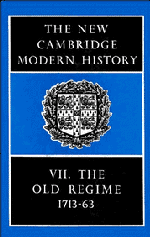Book contents
- Frontmatter
- CHAPTER I INTRODUCTORY SUMMARY
- CHAPTER II THE GROWTH OF OVERSEAS COMMERCE AND EUROPEAN MANUFACTURE
- CHAPTER III THE SOCIAL CLASSES AND THE FOUNDATIONS OF THE STATES
- CHAPTER IV THE VISUAL ARTS AND IMAGINATIVE LITERATURE
- CHAPTER V THE ENLIGHTENMENT
- CHAPTER VI RELIGION
- CHAPTER VII MONARCHY AND ADMINISTRATION
- CHAPTER VIII THE ARMED FORCES AND THE ART OF WAR
- CHAPTER IX INTERNATIONAL RELATIONS
- CHAPTER X THE DECLINE OF DIVINE-RIGHT MONARCHY IN FRANCE
- CHAPTER XI ENGLAND
- CHAPTER XII THE WESTERN MEDITERRANEAN AND ITALY
- CHAPTER XIII THE ORGANISATION AND RISE OF PRUSSIA
- CHAPTER XIV RUSSIA
- CHAPTER XV SCANDINAVIA AND THE BALTIC
- CHAPTER XVI POLAND UNDER THE SAXON KINGS
- CHAPTER XVII THE HABSBURG DOMINIONS
- CHAPTER XVIII THE WAR OF THE AUSTRIAN SUCCESSION
- CHAPTER XIX THE DIPLOMATIC REVOLUTION
- CHAPTER XX THE SEVEN YEARS WAR
- CHAPTER XXI THE DEVELOPMENT OF THE AMERICAN COMMUNITIES
- CHAPTER XXII RIVALRIES IN AMERICA
- CHAPTER XXIII RIVALRIES IN INDIA
- CHAPTER XXIV ECONOMIC RELATIONS IN AFRICA AND THE FAR EAST
- References
CHAPTER XII - THE WESTERN MEDITERRANEAN AND ITALY
Published online by Cambridge University Press: 28 March 2008
- Frontmatter
- CHAPTER I INTRODUCTORY SUMMARY
- CHAPTER II THE GROWTH OF OVERSEAS COMMERCE AND EUROPEAN MANUFACTURE
- CHAPTER III THE SOCIAL CLASSES AND THE FOUNDATIONS OF THE STATES
- CHAPTER IV THE VISUAL ARTS AND IMAGINATIVE LITERATURE
- CHAPTER V THE ENLIGHTENMENT
- CHAPTER VI RELIGION
- CHAPTER VII MONARCHY AND ADMINISTRATION
- CHAPTER VIII THE ARMED FORCES AND THE ART OF WAR
- CHAPTER IX INTERNATIONAL RELATIONS
- CHAPTER X THE DECLINE OF DIVINE-RIGHT MONARCHY IN FRANCE
- CHAPTER XI ENGLAND
- CHAPTER XII THE WESTERN MEDITERRANEAN AND ITALY
- CHAPTER XIII THE ORGANISATION AND RISE OF PRUSSIA
- CHAPTER XIV RUSSIA
- CHAPTER XV SCANDINAVIA AND THE BALTIC
- CHAPTER XVI POLAND UNDER THE SAXON KINGS
- CHAPTER XVII THE HABSBURG DOMINIONS
- CHAPTER XVIII THE WAR OF THE AUSTRIAN SUCCESSION
- CHAPTER XIX THE DIPLOMATIC REVOLUTION
- CHAPTER XX THE SEVEN YEARS WAR
- CHAPTER XXI THE DEVELOPMENT OF THE AMERICAN COMMUNITIES
- CHAPTER XXII RIVALRIES IN AMERICA
- CHAPTER XXIII RIVALRIES IN INDIA
- CHAPTER XXIV ECONOMIC RELATIONS IN AFRICA AND THE FAR EAST
- References
Summary
In the early eighteenth century the western Mediterranean and Italy were dominated by Spain, where the new Bourbon dynasty, galvanised into activity by the ambition of Elizabeth Farnese, achieved a remarkable revival. From 1714, when she arrived in Spain as the second wife of Philip V, till 1746, when the death of her husband removed her from the centre of Spanish political life, Elizabeth and a series of able advisers acted with an energy and daring that gave Spain the initiative in the diplomatic negotiations affecting the Mediterranean region. Because of her family connections with Parma, Piacenza and Tuscany Elizabeth's ambitions were focused on those territories, and Italy was thus affected by the newly revived Spanish diplomacy. Portugal, on the contrary, though it gave a queen to the second effective Bourbon king of Spain, was little concerned in the Mediterranean diplomacy of the period. Portugal was satisfied to have regained her independence. Her colony of Brazil was providing her with a very large income and until 1750 she was content to enjoy independence and prosperity, taking very little part in European diplomacy and making very little contribution to European civilisation. After that date, with the advent of Pombal, Portugal suddenly outstripped Spain in reforming activity.
It was a very remarkable achievement by Elizabeth Farnese and her husband's chief ministers to gain the diplomatic initiative for Spain in the early eighteenth century, for at the end of the reign of Charles II Spain's economic resources had been in a state of almost total ruin. In 1692 the Crown had for the third time declared itself bankrupt although during the seventeenth century the weight of taxation had been increased considerably. The alcabala tax on all sales had been increased to 11 per cent in 1639 and to 14 per cent in 1663.
- Type
- Chapter
- Information
- The New Cambridge Modern History , pp. 269 - 291Publisher: Cambridge University PressPrint publication year: 1957



